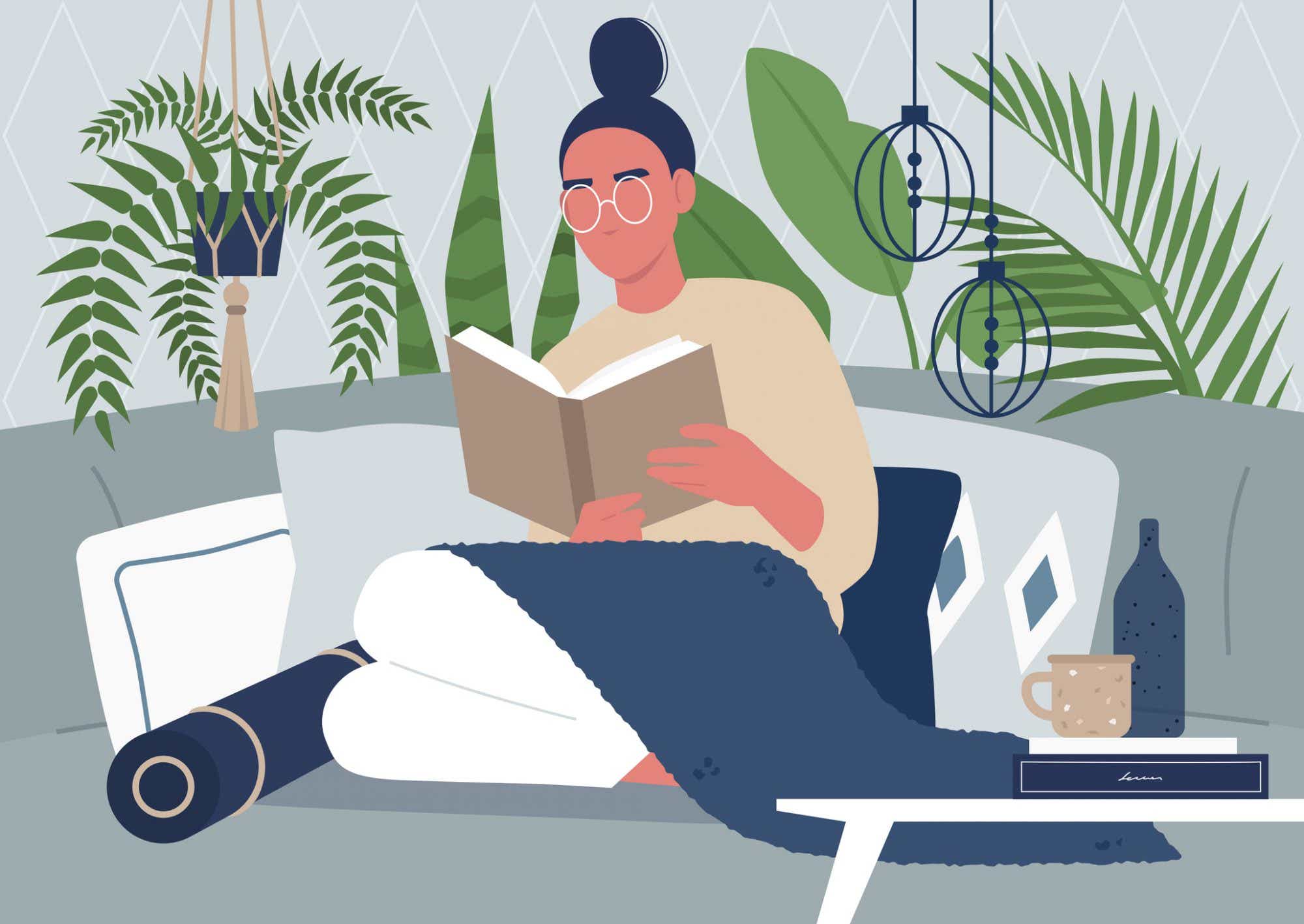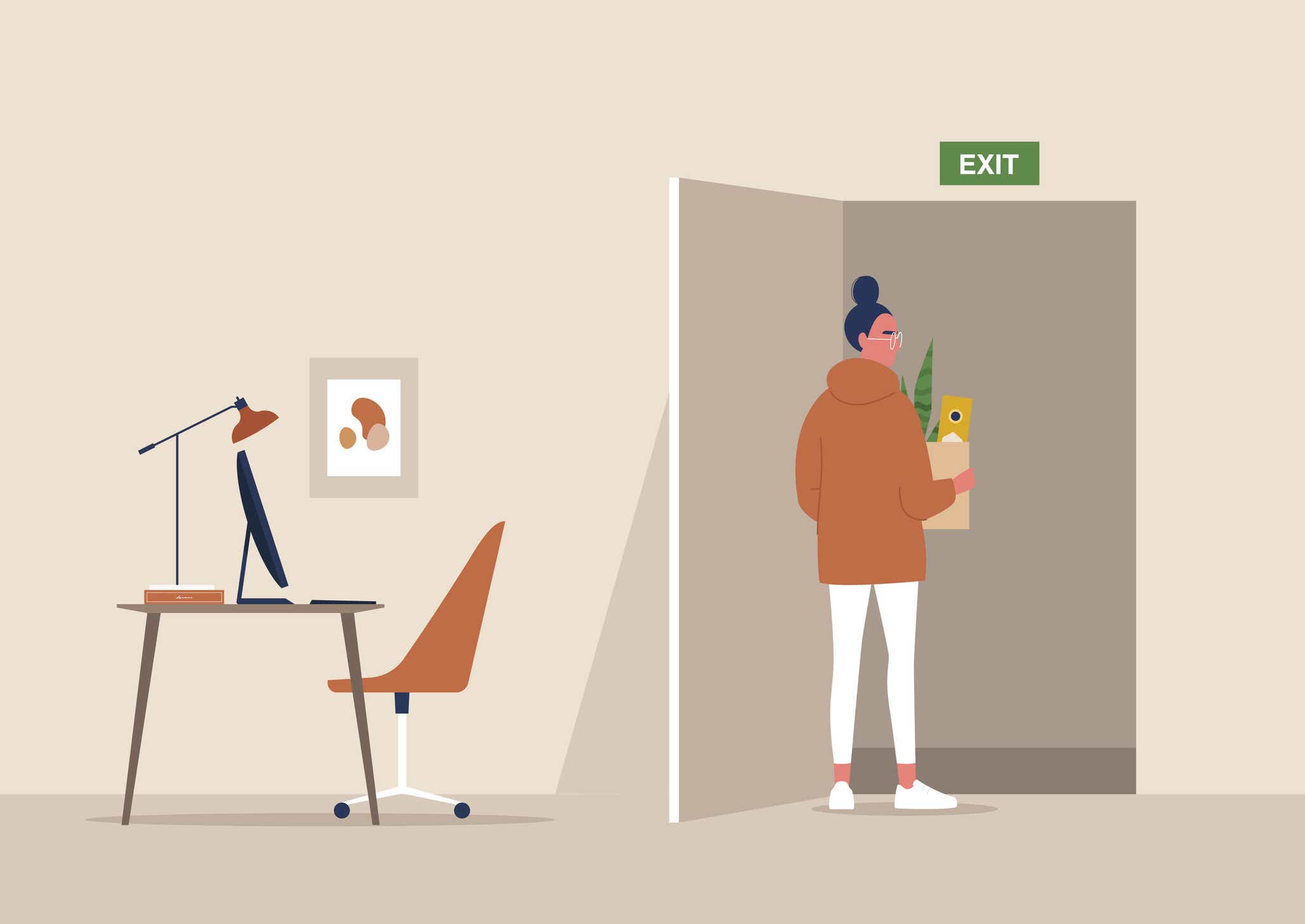Like many life-changing epiphanies, I realized I needed to quit my job during the most mundane of moments.
It was last October; I was a health editor at a digital media publication, sitting through a virtual presentation about all the big initiatives our team would be taking on in 2021. Instead of being energized and excited by the ambitious ideas on the screen in front of me, all I felt was dread.
I can’t do this anymore, I thought. My body felt like a live wire, buzzing with nervous electricity that sent pins and needles shooting down my arms and legs. Every instinct I had was screaming no. For the first time in my overachieving life, I realized: I need to quit.
That moment was a long time coming. Like many Americans (including 84 percent of my fellow millennials), I suffered from burnout—a specific mental health condition where prolonged work stress leaves a person physically and emotionally drained. I had been struggling with it since 2019, to the point where I started seeing a therapist to help me cope. She taught me how to start setting boundaries with work and other strategies to manage my stress. With her support, I started to feel recalibrated—hopeful that I could still love what I do without letting it consume me.
Then came the pandemic. Overnight, my life shrunk to contain only what was inside my 800-square foot Brooklyn apartment: my household (my fiancé and our cats), and work. I was deeply fortunate to still have a job, much less a place to live. But with nothing else enriching my life—no time with friends, no visits to my family in California, no outdoor space (save a fire escape)—there was nothing else to balance out the relentless demands of my job.
It took me a long time to realize that this wasn’t normal or healthy, that I wouldn’t feel better with a week off, or at the end of the month.
According to a March 2021 survey from Indeed, 53 percent of remote employees report working more hours than they did pre-pandemic. I am among that 53 percent; all my carefully erected boundaries crumbled down around me as I pitched stories to cover hours before the workday started, ate lunch standing up in the kitchen while reading emails, and didn’t close my laptop desk until at least 7 or 8 p.m.
Some of the finest, most ambitious work of my career happened last year. But when I wasn’t working, I was a husk of a person. I couldn’t sleep, my face and chest were covered in hives, and I had no energy for anything beyond watching Frasier over and over again. My primary form of communication became sending friends TikTok videos that reminded me of them. Even moving out of the city to the Hudson Valley that summer only helped somewhat. I was in a bigger living space, with easier access to the outdoors, but that still didn’t solve how my job was affecting me.
It took me a long time—literally until that “aha” moment in October—to realize that this wasn’t normal or healthy, that I wouldn’t feel better with a week off or at the end of the month. I could no longer feel proud or excited by the work I was doing, or say to myself “It’s all worth it!” Because, increasingly, it wasn’t.
At the suggestion of my therapist, I started thinking about what I valued, how I wanted to spend my time, and who I wanted to spend it with. Spending 10-12 hours a day hunched over a computer, churning out content for an unforgiving internet, no longer satisfied me. I wanted to have more control over my schedule, actual hobbies that weren’t a side hustle, and the flexibility to spend more time with family and friends as soon as it was safe to do so. This exercise solidified my initial instinct: I needed to quit this job and find a different path.
Sure, I had serious doubts. My deeply practical, Virgo-sun brain screamed that it was foolish to quit without having something else lined up—especially in the midst of a pandemic-induced recession. (I also had no clear idea about what I wanted to do next, beyond sleeping for two weeks straight.) And despite America's relative progress on #mentalhealthawareness, I was still concerned that taking “too much” time off (regardless of what I actually needed) would look bad on a resume to a future employer.
I quelled most of these concerns with some contingency planning. Over the next few months, my fiancé and I pored over our finances and recalibrated our budget. We scheduled a courthouse wedding so that I could join his health insurance plan. Having this financial safety net, and the unequivocal support of my fiancé and friends, finally gave me the courage to act on my gut feeling.
I recognize that I have immense privilege: I'm incredibly grateful for my supportive partner, his steady income (and health insurance plan), and for the fact that I had savings, no dependents, and only some debt. These factors allowed me to make a much-needed change for my health: I wish everyone in my situation were able to do the same.
By January, I felt secure enough to give two months’ notice at work. First I told my boss, then a few weeks later, I broke the news to my team at the end of a staff meeting. While it’s awkward to tell coworkers that you’re quitting over Zoom, they were all incredibly supportive and kind, bombarding me with Slacks about how much they’d miss me. I wish there were a world where it was possible for me to stay working with such wonderful people full-time.
Someone told me that I’d be bored and restless after two weeks, but my god, they were wrong. That first Monday, I woke up about as euphoric as a twenty-something at a Harry Styles concert. FedExing back my work laptop felt like exorcising a stress demon from my body. I’ve been sleeping better (as long as my cat doesn’t wake me up at 5 a.m.), and I finally have time to enjoy things I love, like reading and gardening. I’m doing some freelance writing to help pay the bills, and agonizing over the outline of what I’m hoping could be my first novel. While I still struggle with depression—and get tired and overwhelmed more easily than I used to—I’m slowly starting to feel more like myself than I have in years.
I still don’t know how to answer the “what’s next?” question I frequently get from family and friends. That thought remains paralyzing. I’m worried that whatever comes next, I’ll make the same mistakes I did in my media career—that I’ll care too much, let employers work me too hard, burn myself out all over again.
But when I’m curled up in a hammock outside with my library book, watching the neighborhood birds flock to the feeder, I pause to remind myself how much better I feel every single day, how much happier I am, how much more autonomy I have over my time. I might still be charred at the edges from my burnout, but I’m healing every day. And that’s worth more to me than any job title in the world.

Jessie Van Amburg is a freelance writer and editor who covers health, nutrition, and lifestyle. She lives in the Hudson Valley with her husband and cats.













